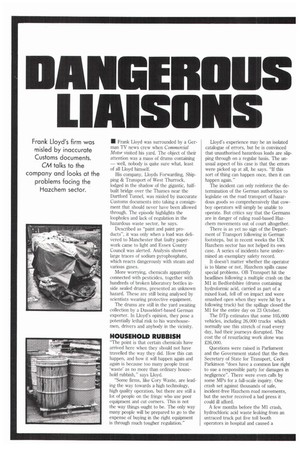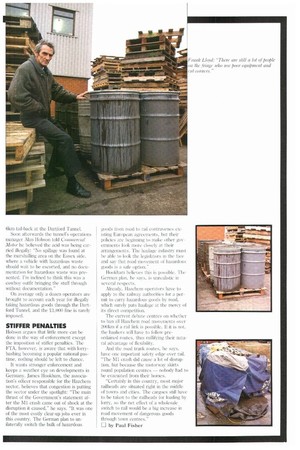A GERIIIIS A S S
Page 28

Page 29

If you've noticed an error in this article please click here to report it so we can fix it.
• Frank Lloyd was surrounded by a German TV news crew when Commercial Motor visited his yard. The object of their attention was a mass of drums containing — well, nobody is quite sure what, least of all Lloyd himself.
His company, Lloyds Forwarding, Shipping & Transport of West Thurrock, Lodged in the shadow of the gigantic, halfbuilt bridge over the Thames near the Dartford Tunnel, was misled by inaccurate Customs documents into taking a consignment that should never have been allowed through. The episode highlights the loopholes and lack of regulation in the hazardous waste sector, he says.
Described as "paint and paint products", it was only when a load was delivered to Manchester that faulty paperwork came to light and Essex County Council was alerted. Analysis showed large traces of sodium pyrophosphate, which reacts dangerously with steam and various gases.
More worrying, chemicals apparently connected with pesticides, together with hundreds of broken laboratory bottles inside sealed drums, presented an unknown hazard. These are still being analysed by scientists wearing protective equipment.
The drums are still in the yard awaiting collection by a Dusseldorf-based German exporter. In Lloyd's opinion, they pose a potentially lethal risk to his warehousemen, drivers and anybody in the vicinity.
HOUSEHOLD RUBBISH
"The point is that certain chemicals have arrived here when they should not have travelled the way they did. How this can happen, and how it will happen again and again is because too many people treat 'waste' as no more than ordinary household rubbish," says Lloyd.
"Some firms, like Cory Waste, are leading the way towards a high technology, high quality operation, but there are still a lot of people on the fringe who use poor equipment and cut corners. This is not the way things ought to be. The only way many people will be prepared to go to the expense of buying in the right equipment is through much tougher regulation." Lloyd's experience may be an isolated catalogue of errors, but he is convinced • that unauthorised hazardous loads are slipping through on a regular basis. The unusual aspect of his case is that the errors were picked up at all, he says. "If this sort of thing can happen once, then it can happen again."
The incident can only reinforce the determination of the German authorities to legislate on the road transport of hazardous goods so comprehensively that cowboy operators will simply be unable to operate. But critics say that the Germans are in danger of ruling road-based Hazchem movements out of court altogether.
There is as yet no sign of the Department of Transport following in German footsteps, but in recent weeks the UK Hazchem sector has not helped its own case. A series of incidents have undermined an exemplary safety record.
It doesn't matter whether the operator is to blame or not, Hazchem spills cause special problems. OR Transport hit the headlines following a multiple crash on the M1 in Bedfordshire (drums containing hydroforrnic acid, carried as part of a mixed load, fell off on impact And were smashed open when they were hit by a following truck) but the spillage closed the M1 for the entire day on 23 October.
The DTp estimates that some 105,000 vehicles, including 26,000 trucks which normally use this stretch of road every day, had their journeys disrupted. The cost the of resurfacing work alone was 26,000.
Questions were raised in Parliament and the Government stated that the then Secretary of State for Transport, Cecil Parkinson "does have a common law right to sue a responsible party for damages in negligence". There were even calls by some MPs for a full-scale inquiry. One crash set against thousands of safe, incident-free Hazchem road movements, but the sector received a bad press it could ill afford.
A few months before the MI crash, hydrochloric acid waste leaking from an untraced truck put five toll booth operators in hospital and caused a 6km tail-back at the Dartford Tunnel.
Soon afterwards the tunnels operations manager Alan I tobson told Commercial Motor he believed the acid was being carried illegally: "No spillage was found at the marshalling area on the Essex side, where a vehicle with hazardous waste should wait, to be escorted, and no documentation for hazardous waste was presented. I'm inclined to think this was a cowboy outfit bringing the stuff through without documentation."
On average only a dozen operators are brought to account each year for illegally taking hazardous goods through the Dartford Tunnel, and the .21,000 fine is rarely imposed.
STIFFER PENALTIES
Hobson argues that little more can be done in the way of enforcement except the imposition of stiffer penalties. The ETA, however, is aware that with lorrybashing becoming a popular national pastime, nothing should be left to chance.
It wants stronger enforcement and keeps a weather eye on developments in Germany. James I lookham, the association's officer responsible for the Hazchem sector, believes that congestion is putting the sector under the spotlight: "The main thrust of the Government's statement after the MI crash came out of shock at the disruption it caused," he says. "II was one of the most costly clear-up jobs ever in this country. The German plan to unilaterally switch the bulk of hazardous
goods iron) load to rail c(intravenes existing European agreements, but their policies are beginning to make it her governments kiok more closely at their arrangements. The haulage industry must be able to look the legislators in the face and say that road movement of hazardous goods is a safe option.
Hookham believes this is possible. The German plan. he says, is unrealistic in several respects.
Already. Hazchern operators have to apply to the railway authorities for a periiiit to carry hazardous g(iods by road, which surely puts haulage at the mercy ot its direct competition.
The current debate centres on ‘vhether to ban all Hazchem road movements over 200km if a rail link is possible. If it is not, the hauliers will have to follow preordained routes, thus nullifying their natural advantage of flexibility.
And the road trunk routes, he says, have one important safety edge over rail. "The MI crash did cause a lot of disruption, but because the motorway skirts round population centres — nobody had to be evacuated from their homes.
"Certainly in this country, m()st major railheads are situated right in the middle of towns and cities. The cargoes still have to be taken to the railheads for loading by lorry, so the net effect of a wholesale switch to rail would be a big increase in road movement of dangerous goods through town centres."
LI by Paul Fisher
































































